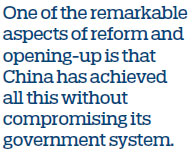Sleeping giant awake and rising
Stemming directly from 1978, China is expected to overtake the United States to be the world's largest economy by 2030, a position it last held in 1820
I recall having a discussion in the school library of my grammar school in the English North Midlands in the late 1970s with some fellow pupils about the rise of China. Could it be that - the "slumbering giant" of Napoleon's famous phrase - was to reawaken at last?
It was probably prompted by reading an article in The Economist or a similar publication after Deng Xiaoping had embarked on his reform and opening-up policy.
When reform and opening-up was launched at the Third Plenary Session of the 11th CPC Central Committee in December 1978, the United Kingdom was in the midst of its so-called Winter of Discontent and the Cold War still rumbled on.
How the landscape has changed in 40 years. China has advanced to be the world's second-largest economy, almost five times bigger than that of the UK, which now vies for fifth place with France. In the process, China has lifted some 700 million people out of poverty, the biggest number in the shortest time in human history.
Now China is expected to overtake the United States to be the world's largest economy by 2030, and the rise of the Chinese middle-income group is one of the biggest global mega trends.
All this stems directly or indirectly from 1978. A year that is not so etched in Western consciousness as it perhaps should be.
Martin Jacques, the journalist, academic and author of When China Rules The World, was unequivocal about the importance of reform and opening-up when he spoke at China Daily's Vision China event in London in September.
"China's reform and opening-up initiated in 1978 was one of the most important events in the 20th century," he said. "It not only led to the transformation of China, but the beginning of the transformation of the world."
My own involvement with China has moved on since my school days when it seemed a very distant and remote place.
I first began reporting on China-related issues on a series of assignments to Hong Kong in the 1990s, as I was interested in how the banking and financial sector was to be affected by the handover.
I recall a conversation I had then with a senior executive in the life insurance sector who said I should go and look what was happening in Shanghai, referring, of course, to the development of Pudong, which was seemingly being transformed overnight from farmland into something resembling Manhattan.
This was the period when reform and opening-up really accelerated after Deng's famous Southern Tour in 1992.
I made my first visit to the mainland in 1997 to Shenzhen and Guangzhou, both destinations on Deng's tour, which were then becoming a hive of activity, although nowhere near the futuristic 21st century cities they resemble today.
But my main involvement with China has been over the past decade as a reporter based in Beijing. When I first arrived permanently after the Beijing Olympics and, more pertinently perhaps, the global financial crisis, the big question was how China's transformation over what was then 30 years would survive much darker economic times.
One of the first people I interviewed then was the journalist Jonathan Fenby. He had just published his monumental Penguin History of Modern China and he was concerned that the next 30 years for China would be more difficult to navigate than the preceding period.
"You have got a sizable middle class now to fit in somehow and there is still rural and urban disparity. Underlying this, there is a need to sustain growths. The leadership has to cushion the effects of the downturn, while at the same time deal with very long term fundamental challenges. It is a hell of an ask," he said.
Although Fenby was clearly right to highlight these issues, China has got through the first 10 of those 30 years that he said would prove challenging in remarkably good shape.
In fact, there is little doubt that China has fared much better than the West in the aftermath of the crisis.
Whereas the incomes of a large part of the populations in the West have fallen, causing widespread discontent, people's incomes have considerably risen in China.
There is a dynamism on the streets of Beijing, Shanghai, Guangzhou, Shenzhen and many other Chinese mainland cities that you just do not see in the West.
For China, after four decades of transformation, the big question now is: What next?
Among the challenges to come will be the opening-up of China's capital markets and also making the Chinese yuan fully convertible, without destabilizing the Chinese economy.
Chinese President Xi Jinping reaffirmed China's commitment to further reform and opening-up at the Boao Forum in Hainan in April last year.
And he announced a number of measures to open up new sectors of the economy to greater foreign investment, including automobiles and insurance.
"Over the last four decades, the Chinese people have embraced the world with open arms and actively contributed our share to the world," he said.
"Today, the Chinese people can say with great pride that reform and opening-up, China's second revolution if you like, has not only profoundly changed the country but also greatly influenced the whole world."

One of the remarkable aspects of reform and opening-up is that China has achieved all this without compromising its government system.
Xi's report speech to the CPC 19th National Congress in 2017 when he first spoke of China's New Era was nothing if not a reaffirmation of the socialist system of government.
Jacques, who I interviewed shortly after the meeting, was clear about this.
"Xi wanted to underscore the fact that the Chinese economy is not gravitating toward capitalism. It is not going to end up as a Western-style economy or a Western-style polity and that it is going to remain profoundly different. And, in that sense, it remains firmly in a socialist rather than a capitalist tradition."
Forty years on from Deng's great initiative, China has more than awaked from its slumber and is moving center stage once more.
The author is senior writer of China Daily. The author contributed this article to China Watch, a think tank powered by China Daily. The views do not necessarily reflect those of China Daily.

(China Daily 02/21/2019 page13)


















